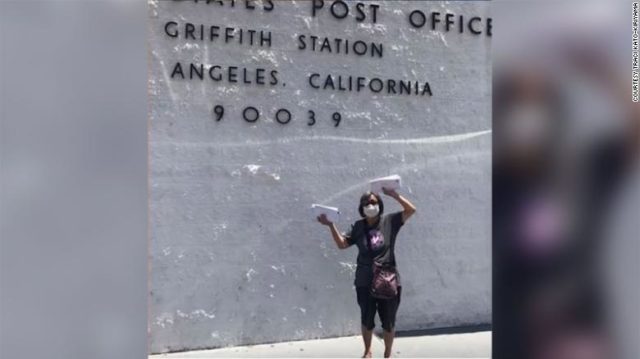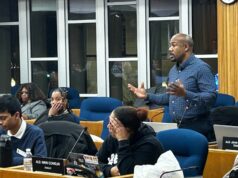
(CNN) — As a third-generation Japanese American, Kathy Nishimoto Masaoka remembers the fight for reparations during the Japanese redress movement in the 1970’s.
Black leaders in the civil rights movement were among the effort’s biggest supporters, she says. Masaoka said winning reparations gave the Japanese American community strength, a chance to stand up and a sense of responsibility. Now she wants the Black community to have the same.
“I think we always felt very connected to other communities of color and saw similarities of our own situations,” Masaoka, the co-chair of Nikkei for Civil Rights and Redress, told CNN. “We can fight for it and if we do link together and build solidarity, we can change this country and we can all heal,” she said.
Masaoka’s organization is among an increasingly diverse group of Americans pushing for reparations for Black Americans. Groups like the Religious Action Center for Reform Judaism, Japanese American Citizens League and Nikkei for Civil Rights and Redress have become allies in the push to find corrective solutions to systemic disparities that impact some Black Americans. This allyship comes at a time when legislation like H.R. 40 — which proposes the creation of a federal commission to study reparations and recommend remedies for the harm caused by slavery and the discriminatory policies that followed abolition — is gaining momentum in Washington, its sponsor Democratic Rep. Sheila Jackson Lee says.
Reparations efforts are also being seen across states, cities, municipalities and historical institutions, as they have begun to explore new ways to address past transgressions.
Last week, a University of Chicago student organization demanded their university pay over $1 billion in reparations to the city’s South Side over the next 20 years. UChicago Against Displacement said in an op-ed that their university has been an “active participant in segregation and redlining” and the money will provide for “long-term true affordable housing.”
Earlier this month, a Boston city councilor proposed a new commission to study reparations and other forms of compensation for the city’s role in slavery and inequality. In two years, the commission would investigate the disparities and “historic harms” experienced by Black Bostonians, drawing on historic documents, archival research and speaking to the community.
Last year, California became the first state to establish a reparations task force commissioned with studying the state’s role in perpetuating the legacy of slavery and proposing recommendations. Under AB3121, the task force is expected to recommend legislation this year.
These ongoing conversations at various levels have been spearheaded by Black people supporting the quest for reparations, but other communities are now joining in support.
These diverse groups are part of the more than 350 organizations in support of H.R. 40. The commission would also consider how the U.S. would formally apologize for “perpetration of gross human rights violations and crimes against humanity on African slaves and their descendants.”
Rep. Lee, who reintroduced H.R. 40 last year, told CNN the fact that other communities have received reparations on a federal government level shows Congress they can do the same for Black people.
H.R. 40 was first introduced in Congress by Michigan Democrat John Conyers in 1989. Former Rep. Conyers, who served until 2017, had consistently pushed for legislation on reparations repeatedly over the span of multiple sessions of Congress. Following his departure, Rep. Lee became the bill’s primary advocate.
Early last year, the bill was advanced by the House Judiciary Committee in a 25-17 vote and now faces a full House vote. Rep. Lee is hopeful and says that over 200 of her colleagues are ready to vote to pass the bill. But she is also aware the bill faces pushback in the Senate vote and urges her colleagues to understand that enslaved Black people created the economic engine from which the nation was built.
Support for reparations from people outside the Black community is a sign that Jewish and Japanese American communities are on the side of justice, Kamm Howard says.
Howard, who is the National Male Co-Chair of the National Coalition of Blacks for Reparations in America, says if the federal government made attempts to address the harm inflicted on other communities, it’s only right that lawmakers figure out a way to grant reparations to Black Americans.
“There’s been no attempt by the American government to specifically address the harms and continued harms inflicted upon us,” Howard told CNN.
A Jewish moral call
Some in the American Jewish community have long garnered support for reparations. In 2019, the Union for Reform Judaism passed a resolution in favor of reparations calling for a federal commission to “study and develop proposals for reparations to redress the historic and continuing effects of slavery” and “systemic” racism against Black Americans.
Yolanda Savage-Narva is the director of racial equity, diversity and inclusion at the Religious Action Center of Reform Judaism, the part of the Union for Reform Judaism that focuses on advocacy and social justice work.
“Our organization really understood that the call for the study of reparations was a Jewish moral call,” she told CNN. “There is an imperative around making sure that every party of our humanity is seen as equitable human beings and the call for reparations was a move for the reformed Jewish community to really put a stake in the ground.”
Victims of the Holocaust within the Jewish community have received reparations and continue to collect annual pensions from the German and French governments.
Savage-Narva said she believes this adds to the support and shows the US that acknowledging and paying reparations is an important step in the healing process.
“The German government really did what they needed to do with truth and reconciliation, and have made a commitment to, as much as possible, making an effort to repair the harm that was done,” she said. “Because the Jewish community has had its own historic trauma, they can make that connection and understand how important the process of reparations is.”
Why Japanese Americans received reparations
The Japanese American community was one of the first communities to receive redress from the US government and has been supporting the movement for reparations for decades.
Japanese Americans who interned in concentration camps in the US during World War II from 1942 until about 1946 received reparations as part of the Civil Liberties Act of 1988. More than four decades after their imprisonment, the law gave each surviving former internee $20,000.
Traci Kato-Kiriyama is the core organizer for the Joint Reparations Committee of the Nikkei Progressives, a multi-generational community group that stands for immigrant rights and Japanese American, Muslim and Little Tokyo issues.
“One of the reasons we understand the importance of reparations is looking at Japanese American redress and reparations,” Kato-Kiriyama told CNN. “It did take the support of all kinds of people to come together, and we couldn’t have done it on our own.”
David Inoue, executive director of the Japanese American Citizens League, said supporting the movement to pass H.R. 40 is the right thing to do and will lead to further comprehension and response to the “current injustices ingrained in the system.”
Inoue told CNN he believes Congress is in a very different place since Japanese Americans received reparations.
“The more of us who speak out, the harder it will be to ignore us and our country’s responsibility to address and respond to this historic injustice,” Inoue said.
“We do need federal reparations”
The idea of reparations has been an ongoing debate since the end of the Civil War in 1865 when freed slaves were promised 40 acres and a mule. The National Coalition of Black for Reparations in America’s founding meeting in 1987 convened for the purpose of broadening the base of support for the long-standing reparations movement.
The H.R. 40 bill was then introduced in 1989. Writer Ta-Nehisi Coates renewed the conversation regarding reparations in his 2014 piece in The Atlantic, “The Case for Reparations.” Since its reintroduction into mainstream media, there have been efforts at the community, state and national levels to compensate Black people for slavery and issues of systemic racism.
“All of these efforts, no matter where they are happening, are important and good to keep pushing forward,” Kato-Kiriyama told CNN. “It also reminds us that we don’t have to wait for one huge federal bill, although we do need federal reparations.”
Nationally, the movement for reparations is expected to take some time.
Experts say that if the bill advances past the House, it faces opposition from some Democrats and most Republicans — and it’s unlikely to have enough votes for a filibuster-proof majority in the Senate.
Dr. Ron Daniels, Convener of the National African American Reparations Commission, told CNN he finds it remarkable how far the idea of reparations has come since its introduction as an educational bill in 1989.
“We’re knocking on the door of H.R. 40 being enacted either by legislation or more likely by executive order,” he said. “That is a major moment in American history.”
There are five main injuries of slavery that still affect the Black community today including peoplehood and nationhood; education; health; criminal punishment; and wealth and poverty, according to NCOBRA.
Howard said the bill would look at these continuous injuries, among others, to define the degree of harm the Black community has suffered and continues to suffer.
“There is a rise today of racism against African Americans and the push has to be: why has American not been able to find a pathway to ease the tensions of race?” Rep. Lee told CNN. “Every time we move on something brings us back to the issues of race. This bill offers an opportunity to bring people together by understanding.”
The-CNN-Wire
™ & © 2022 Cable News Network, Inc., a WarnerMedia Company. All rights reserved.
































